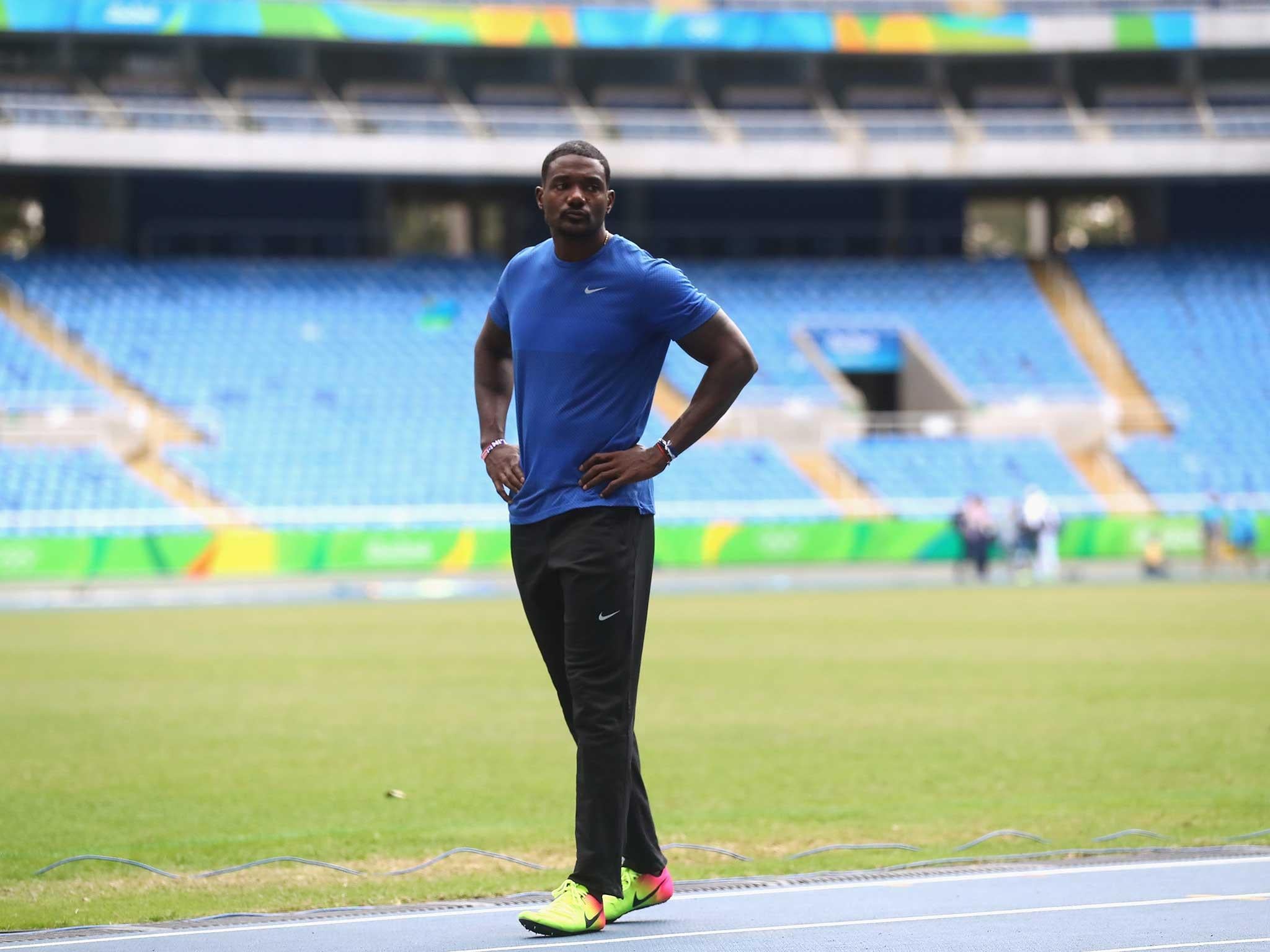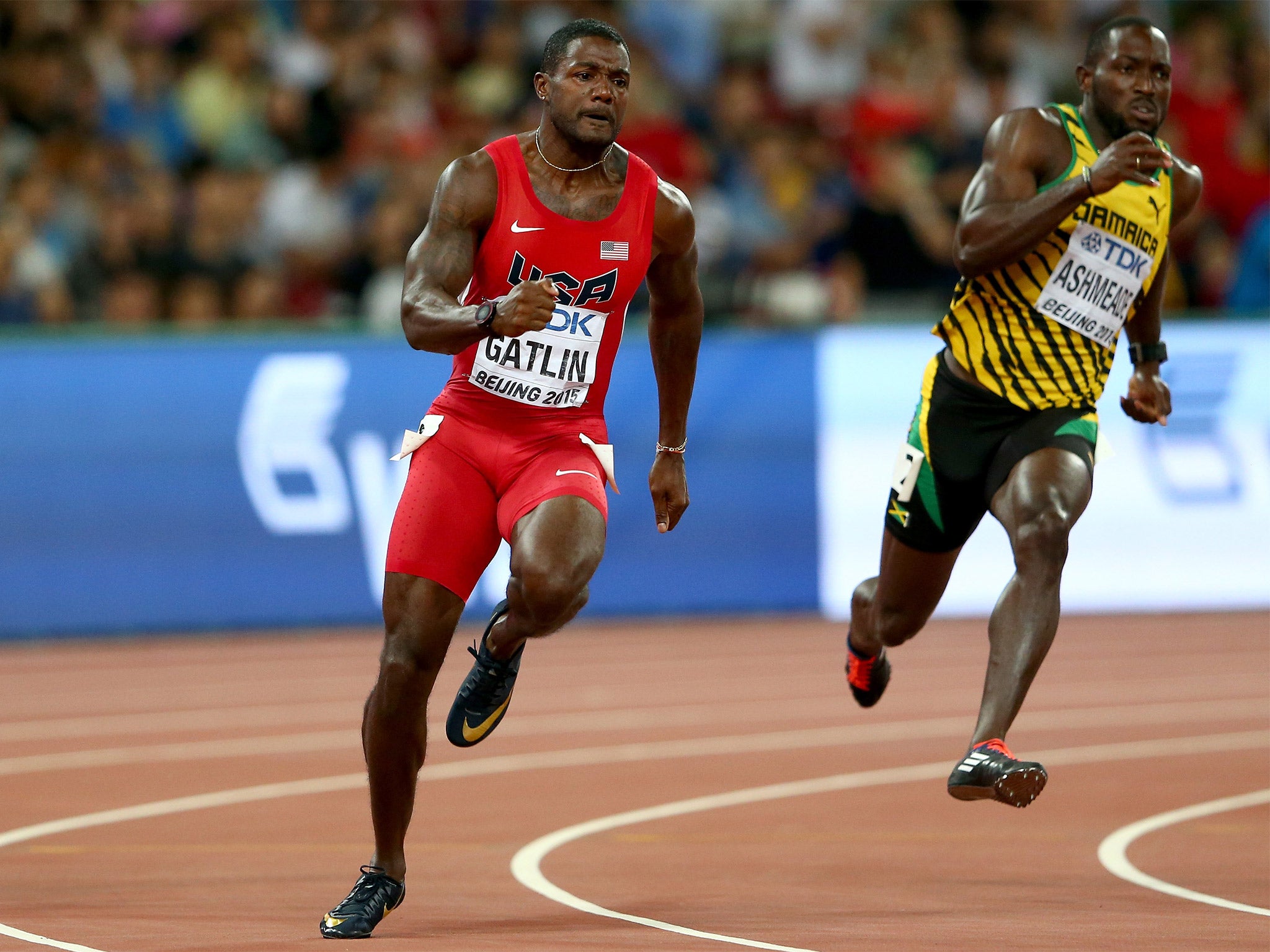Rio 2016: Justin Gatlin continues to deny doping accusations and says 'I served my time, just let me go out and run'
In an exclusive interview with the Independent, the former 100m champion still denies drug claims made against him and admits that Usain Bolt has become an inspiration for him

Ten years ago Justin Gatlin's life fell apart.
Gatlin was the poster boy of track and field. The fastest man on the planet. The former attention-deficit disorder sufferer turned champion who had blazed to 100m glory at Athen's Olympic Stadium, the spiritual home of the Games.
The world title followed in 2005, then the world record. Nothing could stop Gatlin, it seemed. And then in May 2006 came an announcement which had become all too familiar for an increasingly battered sport, weather-beaten by an onslaught of doping rumours, enquiries and confessions over the preceding decade.
Gatlin had tested positive for testosterone.
Gatlin denied the claims. Along with his coach Trevor Graham he insisted that he had been sabotaged, alleging that his massage therapist had rubbed cream laced with testosterone into his buttocks, a carefully planned vengeance after learning his contract was not being renewed.
No one believed him. After all, Graham had a track record of coaching dopers and Ben Johnson, Marion Jones, Tim Montgomery, Dwain Chambers along with virtually everyone else in the sport's history of doping had protested innocence before later admitting wrongdoing. Gatlin's story was dismissed. An appeal against his initial eight year ban, succeeded in reducing it to four but Gatlin would be 28 by the time he could return. Everyone assumed he was finished.
“It was a tough time for me,” Gatlin, now 34, says from trackside as he prepares for his third Olympics in Rio. “I was in utter shock when I heard about the positive test. I always told myself I would work on coming back. It never totally left my mind but over the next couple of years I felt pretty worthless at times. Life didn't really seem worth living.”
Left out in the wilderness, Gatlin pinpoints the 2008 Beijing Olympics as the moment when he managed to get back on track. It should have been his crowning moment, his opportunity to defend his Olympic title. But as he watched on television, he, like the rest of the world, became transfixed and inspired by one man. Usain Bolt.
“In a way being away from the sport during that time was a gift and a curse,” he says. “I was able to sit back and watch the rise of Bolt. I would sit, watch and wonder what it would be like to compete against someone like that. I think that psychologically he took a lot of the guys I'd been racing against apart but seeing what he was doing gave me a lot of drive to come back, step my game up and try to compete against someone like that.”
Since returning in the summer of 2010, Gatlin has steadily developed into Bolt's major contender, the man most likely to stop him from claiming a record hat-trick of Olympic 100m, 200m and 4x100m relay titles. While Bolt has struggled with injury this summer, pulling out of the Jamaican trials with a tight hamstring, Gatlin's consistency has been relentless, belying his advancing years.
He holds the top two fastest 100m times of 2016 and his 200m time of 19.75 is 0.14s fastest than Bolt has managed this summer. But virtually no one is rooting for a Gatlin victory in Rio.
Last year's World Championships 100m and 200m showdowns between Bolt and Gatlin were billed as 'Good versus Evil'. Television broadcasters and newspapers worldwide were unashamedly open in who they were backing, and their subsequent relief when Bolt pipped the American in both races. Gatlin's agent Renaldo Nehemiah said his charge was deeply hurt by what he perceived as a media vendetta against him.
Gatlin knows the stark truth. No matter how much he protests his innocence, how many medals he now wins, how fast he runs, many will always see him as an inconvenience – a reminder of sport's chronic, seemingly unwinnable battle against cheating.
He sighs as he considers the sentiment which has stalked him ever since he returned to competition. “You know, I’ve gone off and served my time. I’ve done everything I needed to do to be able to come back. I’ve always said, let me go out and run and I’ll show you guys that I’m a true champion. And I think I'm the only one in history who's failed a test, who's come back and done that. I've always stuck to my story too. I think that the proof of the pudding lies in that. I'm honestly not worried what everyone else thinks of me. I’m not going to sit out for four years to come back to be knocked down by a few words or a few opinions. If I was going to let that happen, I should never have come back in the first place.”

As the rivalry between the two has intensified in the past couple of years, Gatlin-Bolt relations have become noticeably pricklier. Last month Bolt was given a medical exemption by Jamaican officials to compete in Rio after pulling out of the national trials with injury. Gatlin was quick to complain, commenting, 'He's injured, gets a medical pass. Our country doesn't do that.' Bolt responded, describing the comments as 'disrespectful' and warning that Gatlin would 'face his full wrath' in Rio.
Gatlin remains calm, describing Bolt as his biggest inspiration when training. “He gives me determination, gives me drive,” he says. “Competing against him is sink or swim. When I watch him run I see someone who's going to get it done physically and mentally. And he means I have to be on my A game at all times, as if I come out there not ready, he's gonna beat me hands down.”
As the hype slowly builds towards the 100m final, it's easy to wonder whether Gatlin finds himself getting angry at the almost universal support which Bolt draws, compared to the animosity he seems to face.
He disagrees. “What would me being angry achieve, what’s it gonna help?” he says. “It’s gonna help me be what? A better athlete? No. I just wanna show everybody on the track in my performances. I think I’ve done a pretty good job of that. Besides, ever since I came back, no sprinter I've raced has ever come up to me and said anything negative or given me crazy looks or anything like that. It’s always been, ‘Good to see you back’, ‘Nice to see you. Go out there and do what you have to do.’”
Many of the qualms people have with Gatlin relate to the fact that at 34, long over the hill by the standards of most sprinters, he's running the fastest times of his career, and appearing to get better and better. In contrast former rivals Tyson Gay and Asafa Powell, both a year younger, have long faded. Some have questioned whether the banned substances Gatlin consumed in 2006 are still aiding him.
“I’m 34 but I feel six years younger,” Gatlin explains. “You have to remember I was sitting out for four years. Instead of running fast year in, year out and having injuries and a few surgeries like Tyson or Asafa, I was able to rest my body, keep my mind open and basically come back like a rookie. And I changed my lifestyle. One thing I learned away from the track and field world is that athletes get away with a lot of stuff because we train every day. So we get into bad habits like eating late, eating the wrong kinds of food, going out and staying up late. You end up telling yourself, 'I'll feel ok tomorrow. I'll run off all that junk food, I'll run off all these candies and these sweets.' I eliminated all that from my diet and stuck to more vegetables, more fruit. I've eating and living cleaner and it's made me a far better athlete.”
Gatlin explains that even when winning Olympic and World gold medals from 2004-2005, he wasn't especially disciplined. “I would be on Xbox till about three in the morning,” he laughs, “I would sleep with that controller in my hand. I did that a lot, maybe even drinking at the weekend at times with friends, going out sometimes. But I've put that in the past. These days I'm in bed by 10.30 each night. It's crunch time for me, I haven't got many years left.”
Four years ago, Gatlin took bronze at London 2012 behind Bolt, running what was at the time a personal best of 9.79 seconds. The air of defiance which surrounded his medal celebrations that day antagonised the likes of former Olympic gold medallist Darren Campbell, who felt that he shouldn't have been in the race.
Gatlin says he wishes people would focus on what he believes is a story of resilience. “I’m a competitor,” he says. “I’ve always known I’m a good runner at heart and I just use that. I see someone like Bolt running certain times and I want to push myself, and go out there and be better than them. And I've come so far since I returned in 2010. I've shown so much toughness. I didn’t make the World finals for Daegu in 2011 but I went out there and ran with frostbitten Achilles on both sides.
"In 2012 I won the Olympic trials, and I came and got a bronze medal. I've won indoor world titles with the same time I ran as a rookie. The past three years I've got double silver at two World Championships. When I came back, I think a lot of people thought I wouldn't make it to a championships again and instead I've gotten better and better every year. That’s all I’m focusing on, being a better Justin and not worrying what other people think about me.”
In the coming week, Gatlin will need to switch on the tunnel vision as he aims to block out the portrayals which will once again depict Bolt as the conquering hero and Gatlin as the archetypal pantomime villain, his name blackened by an offence he still insists he didn't commit. It's easy to wonder how he deals with the knowledge that most will never believe his version of those events ten years ago.
“I think all the people who stood by me during my adversity, like my parents, those are the people I really care about and if they're ok with the person I am today,” he says. “My family has been such a rock for me. They don't have an athletic background at all so to deal with all the propaganda and watch their own child suffer the way I have, they've done an amazing job. When I was at my lowest, they were there to help and guide me. They told me to try and stay focused, do what my God-given talent says, stay in shape and when I was able to return, go back out there and run for my life.
Join our commenting forum
Join thought-provoking conversations, follow other Independent readers and see their replies
Comments
Bookmark popover
Removed from bookmarks